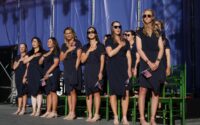Professional tennis players shake hands after their matches — except, in some noteworthy cases, when one participant is Ukrainian and the other either Russian or Belarusian.
Opinion | Ukraine’s Elina Svitolina’s handshake refusal baffles Wimbledon crowd – The Washington Post
“What should I have done. Stayed and waited?” Ms. Azarenka asked in her remarks to the media.
The no-handshake policy is rooted in war: Ukrainians have taken to withholding handshakes from post-match meetups as a protest of the Russian invasion of Ukraine — for which Belarus has provided critical support. The trend has made for a string of awkward moments on the pro tour, as Ms. Svitolina and her compatriots have upended what one commentator called the “emotional crux” of a tennis match.
A year ago at Wimbledon, handshakes weren’t an issue. The tournament barred players from Russia and Belarus on the rationale that “it would be unacceptable for the Russian regime to derive any benefits from the involvement of Russian or Belarusian players.” The Association of Tennis Professionals called the action “unfair” and said discrimination on the basis of nationality violated its agreement with Wimbledon. By excluding some of the world’s top tennis talents, the move also cheapened the entire competition.
For this year’s championships, Wimbledon reversed the ban, to the dismay of Ms. Svitolina. “Last year it was clear message from Wimbledon,” she told reporters. . “This year it was changed because of different kind of pressure. … I don’t really support the change.” When asked about the crowd’s confused behavior this week, she replied, “Tennis organizations, they have to come out with a statement that there will be no handshake between Russian, Belarusian and Ukrainian players. … Some people don’t really know what is happening, so I think this is the right way to do.”
The Women’s Tennis Association issued a statement Monday explaining the situation to fans and noting that it was a “personal decision” as to whether to shake hands. Meanwhile, Wimbledon chief executive Sally Bolton said her organization had “no intention” to intervene.
Nor should it. The championships’ decision to convert tennis courts into geopolitical proving grounds last year was misguided, punishing individual Russian and Belarusian players who bear no personal responsibility for the Ukraine invasion and who do not compete for a national team in Grand Slam tournaments such as Wimbledon. So, too, is Ms. Svitolina’s “personal decision” to refuse handshakes with those players. If there’s one thing we know about Russia and Belarus, it’s that athletes have little sway over — and hence responsibility for — the belligerent actions of their authoritarian regimes. What’s more, some of these players have either criticized the war or expressed sympathy for its victims.
An enlightened world appreciates the distinction between regimes and their subjects. Shake those hands.
Source: News

